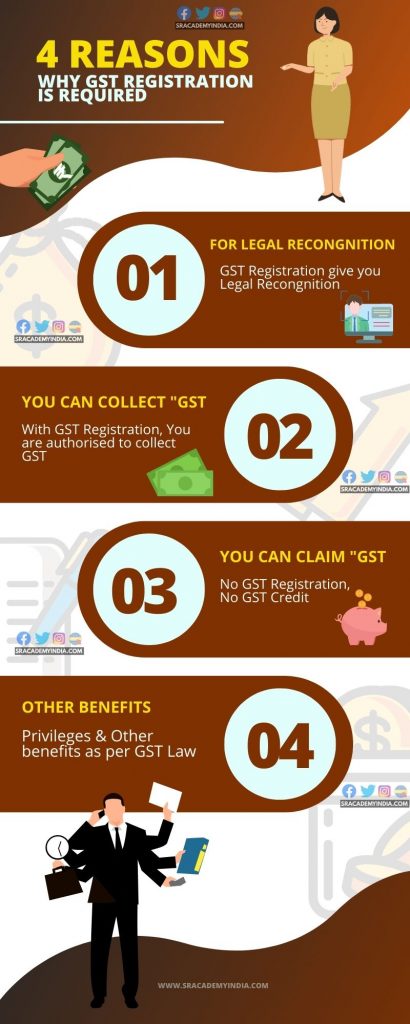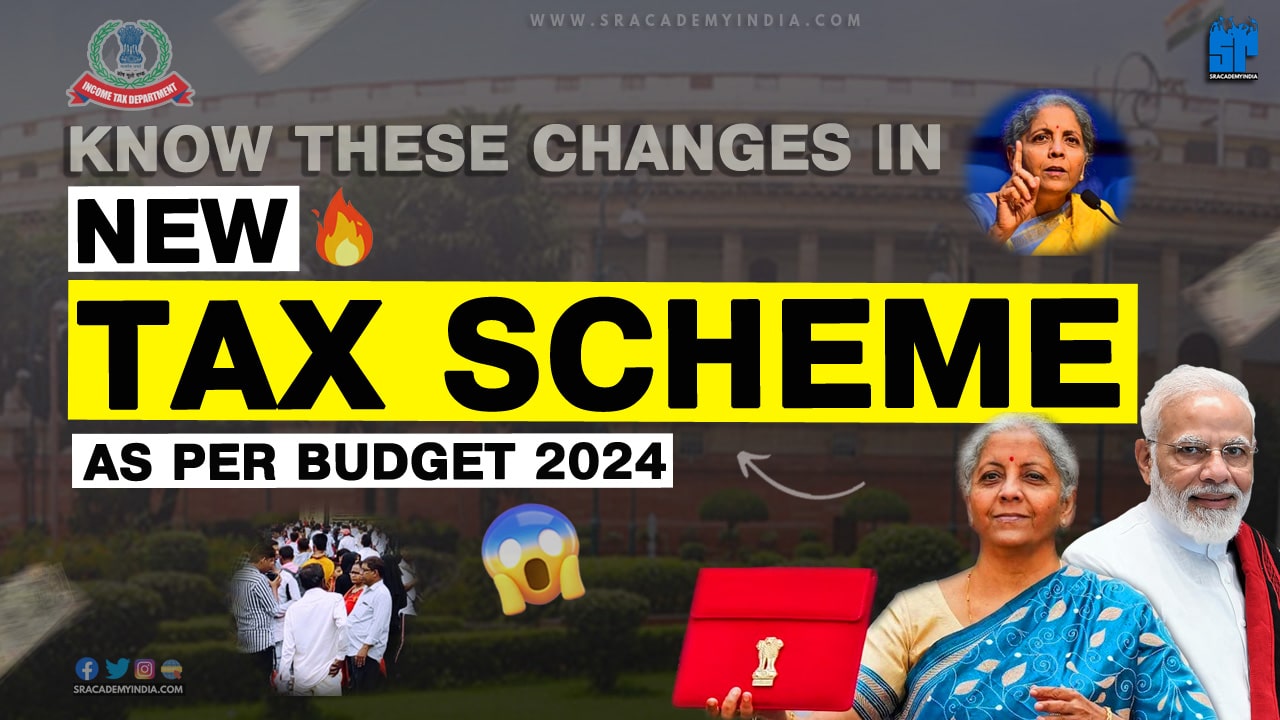Who should register for GST?
As per the Goods and Services Tax Act, 2017, any business with a turnover of Rs. 40 lakh and more must register for GST. For north-eastern and hill states, the turnover threshold for GST registration is Rs. 20/10 lakh depending on the state.
Mr.Ravi chandran, a 37 years old individual is planning to start an Import business, Is GST registration required for him..!!
M/s Gupta enterprise, a company, is planning to sell goods all over India, Is GST registration mandatory..!!
Now the question is, to whom Goods and Service Tax (GST) registration is required.
Is it for all the persons..!!
Go ahead..!!
In this article, we will discuss the rules, to whom GST registrationit is mandatory and to whom it is optional. There are certain clauses mentioned in GST to get registered under GST. Those concepts are crafted clearly with practical examples.
Before going to understand To Whom GST registration is Mandatory, firstly understand.
Why GST Registration is required?
Let’s Start..!!
I will tell you 4 reasons to get registered under GST.
1. Firstly, GST registration gives you “Legal recognition”.
Once you get registered under GST, You will become a Legal person as a Registered Tax payer with 15 digit unique GST number.
Eg: GST No: 22ABCDE1234X1Z5
2. You can “Collect GST”.
Yes, If you are planning to sell the goods or render services in such a case, you are authorized to collect GST at a certain percentage (%) as fixed by the GST department from time to time (Otherwise you are not permitted).
3. You claim “ITC”.
It means, When you as a supplier of the goods or Service provider collected GST from the goods or services or both, then, you are eligible to take “Input Tax Credit (ITC)” on your purchased goods (with some conditions).
No GST Registration, No ITC.
4. You may be eligible for any other privileges and other benefits as per GST Laws – Wait for it, GST may intimate from time to time.
Tip: If you are not registered under GST, you are not permitted to claim GST credit.
Read More: Want to know More about ITC
I think you got reasons why you are required to get registration on a voluntary basis. But if you want to know legally to whom GST registration is required, continue reading…..
Now Let’s understand “To whom GST registration is Mandatory”
The GST department made compulsory as per the provisions of Sec 24 of CGST /SGST Act to get registered / to take GST registration is mandatory for the following persons.
The liability to get registered under GST arises when you are a Supplier of the goods and / or services & also if your Aggregate turnover in the financial year is more than the exemption threshold of 40 lakh rupees / 20 lakh rupees / 10 lakh rupees (Depends upon the state you will make business)
Simply, If your Annual Turnover crossed the said threshold limit, then such person shall obtain the GST Registration as a “Normal Taxable person”
As mentioned in the GST Law, Not only the supplier of goods and also Service providers are also liable for GST Registration.
The GST law enlists certain categories of suppliers who are required to get compulsory registration irrespective of the turnover that is to say, the threshold exemption of 40/20/10 lakh rupees as the case may be is not applicable to them. Some of such suppliers who need to register compulsorily irrespective of the size of their turnover are those who are
10 Persons who needs GST Registration irrespective of Turnover Size are listed below.
Hurry Up..!!
To Whom GST registration is Mandatory?
1. Inter-State Supplies:
Any person who want to make Inter-state supplies of Taxable goods and services, he is required to obatain GST Registration compulsorily. The treshold limit of Rs.40 Lakhs is not applicable in that case.
Case 1 :
When Mr. Mahesh sold goods worth of Rs.35,00,000 within Mumbai (i.e. Within State) during the FY 2020-21.Whether GST registration is required?
In this case, for Mr. Mahesh, GST registration is Optional.
Reason:
1. Mr. Mahesh sold goods worth of Rs.35,00,000 is below the GST registration limit of Rs.40,00,000 for the state of Mumbai and
2. Mr.Mahesh has sold all the goods within state only.
Case 2 :
When Mr. Mahesh sold goods worth of Rs.35,00,000 to the customers of Mumbai and Chennai (i.e. Outside State or Inter – State) during the FY 2020-21.
In this case, for Mr. Mahesh, GST registration is Compulsory.
Reason:
1. Mr. Mahesh sold goods to the customers of Mumbai and Chennai i.e. Outside State.
2.When you want to sell goods outside the state, then GST registration is compulsory irrespective of Turnover and Value of goods.
2. Reverse Charge:
Normally the Service Provider is liable to collect GST from its customers and Take ITC. Anything collected more than claimed ITC; such balance will be deposited into GST a/c through Electronic Cash Ledger.
But under Reverse charge, the Service recipient is liable to collect GST from the supplier of the goods or service providers. i.e. the liability to pay tax lies with the receiver of the goods or service receiver.
Therefore, any person receiving supplies on which tax is payable by the recipient on a reverse charge basis is required to get registered under GST.
There is a list under which the type of Goods and Services for which Reverse charge will apply (will be discussed later). A few examples of services are mentioned here to understand this concept.
4 Examples:
1. Goods Transport Agency (GTA) Services
In the case of GTA Services, GTA is a Service Provider and the person paying the freight is the Service Recipient. As per the above discussions, the Service recipient will collect the GST from GTA and will pay it to the GST department as per GST rules.
2. Legal Services by Advocate
Advocate – Service Provider
Person receiving the advocate services – Service Recipient
3. Services supplied by an insurance agent (i.e. Supplier of Service) to any person carrying on insurance business (i.e. Recipient of Service)
4. Services supplied by a recovery agent (i.e. Supplier of Service) to a banking company or a financial institution or a non-banking financial company (i.e. Recipient of Service) etc.,
3. Casual Taxable person:
Any person who is not having a Fixed place of business in the State or Union Territory from where he wants to make supply. However if you are making supplies not regularly or occasionally such person is called as “Casual Taxable person”. For those people, there is no Threshold limit.
But you are supplying “Specified Handicraft goods”, you are entitled to a threshold exemption of Rs. 40/20/10 Lakh as per states.
(Handicraft goods are specified in Notification no. 32/2017-Central Tax dated 15.09.2017 as amended by Notification no. 38/2017-Central Tax dated 13.10.2017.)
4. Non-resident Taxable person:
Any person residing outside India and has no fixed place of business within India such person shall be entitled for compulsory GST Registration. Therefore, Non-resident Taxable person are compulsory to get registered under GST. The Non-resident Taxable person and Casual taxable persons are liable to apply for Registration 5 days prior to commencement of business.
Tip:
1. When no fixed place of business in the State of Union Territory – “Casual Taxable person” registration is required.
2. No place of business within India – “Non-resident Taxable person” registration is required.
3. The basic difference between Casual Taxable person & Non-resident Taxable person is the former will have PAN number and the latter DON’T have PAN.
5. Agent
A person who supplies either goods or services on behalf of another registered taxable person. Such a person will be called an “Agent” and the registered person will be called as a “Principal”
6. E-Commerce Operators
The persons who provide platform to the suppliers to make supply through it. Simply, the person who supplies goods or services or both, including digital products over digital or electronic network
Eg: Amazon, Flipkart, Alibaba etc.,
For E-Commerce operators GST registration is Mandatory. The benefit of exemption does not apply to them. Irrespective of the supplies they made during a period, they are liable to get registered under GST.
Suppliers of goods who supply through such e-commerce operators who are liable to collect tax at source. In case of Intra state transactions CGST @0.5% & SGST @0.5% is to be collected by the E-Commerce operators. In case of Intra-state transactions, IGST @0.5% will be applicable.
Persons supplying services through e-commerce operators need not take compulsory registration and are entitled to avail the threshold exemption of Rs. 20 Lakh as per Notification No. 65/2017-Central tax dated 15.11.2017. Those e-commerce operators who are notified as liable for GST payment under Section 9(5) of the CGST Act, 2017.
7. TDS Deductor
It is the case for Governments.
In case of Government & Government undertakings and other Notified entities whose value of Supply under a Contract exceeds Rs.2,50,000 to Vendors, in such a case the Government department is required to deduct Tax before making such payment. The person who is deducting the tax is called “Tax deductor” i.e. Government.
For example, “A Ltd” of Maharashtra has supplied goods worth Rs. 10,00,000 (plus GST @18%) to “B Ltd” (a Vendor) in Maharashtra on 8.11.2021. The total contract value is Rs. 10,00,000 plus GST @18%.
In this case, the transaction is covered under GST-TDS as the contract value is exceeding Rs. 2,50,000. And both the parties are in the same state, so CGST @1% and SGST @1% is applicable. Value to be considered is Rs. 10,00,000 excluding GST.
CGST TDS is Rs. 10,000
SGST TDS is Rs. 10,000
To pay both the collected CGST & SGST, the Government shall opt for GST Registration as the government is a Deductor of TDS.
Read More: GSTR-1 : Complete guide
8. Input Service Distributor [ISD]
Input service distributor is a person who is the supplier of goods or services or both but receives tax invoices towards receipt of input services and issues a prescribed document for the purposes of distributing the credit of central tax (CGST), State tax (SGST)/ Union territory tax (UTGST) or integrated tax (IGST) paid on the said services to a supplier of taxable goods or services or both having same PAN as that of the ISD.
For Example,
It’s a like food earned by the parent will not be consumed by the parent itself and it will be distributed among the kids equally.
9. OIDAR
Online Information Database Access and Retrieval services (OIDAR) is a category of services which will be provided through the medium of internet and received by the recipient online. Here, there will be no physical interface with the supplier of such services.
Consider the example of Internet adversting, the customer will make the payment for promoting the product over internet and the services will be provided by the OIDAR through online. There will be no physcial intervention of both service provide or service receiver in this case.
Other examples are Online marketing, providing cloud services, online gamingetc.
10. Any other notified person
Any other such other person or class of persons as may be notified by the Central Government or a State Government on the recommendations of the Council will be required to obtain GST registration compulsorily.
Frequently Asked Questions (FAQ’s):
1. Is GST registration mandatory for Amazon seller?
Yes. Any person who wants to register as a “Amazon Seller” is required to take GST Registration. However, No GST registration is required if you sell exempted goods.
2. Is GST registration mandatory for E-Commerce?
Yes. As per the Goods and Service tax law, E-Commerce operators are required to get registered under GST to supply goods or services or both irrespective of their Turnover.
I hope you understood the topic “To who GST registration is mandatory”
Please “COMMENT” on which of the above topic you like the most. Also, share this article with Friends & Family.
Thanks for reading…!!
Disclaimer: Every effort has been made to avoid errors or omissions in this material. In spite of this, errors may creep in. Any mistake, error or discrepancy noted may be brought to our notice which shall be taken care of by our team in our next article or edition. In no event, the author or the website shall be liable for any direct or indirect or special or incidental damage resulting from or arising out of or in connection with the use of information.






